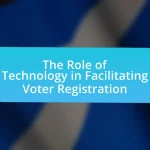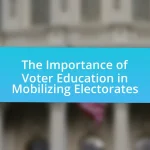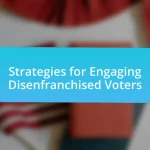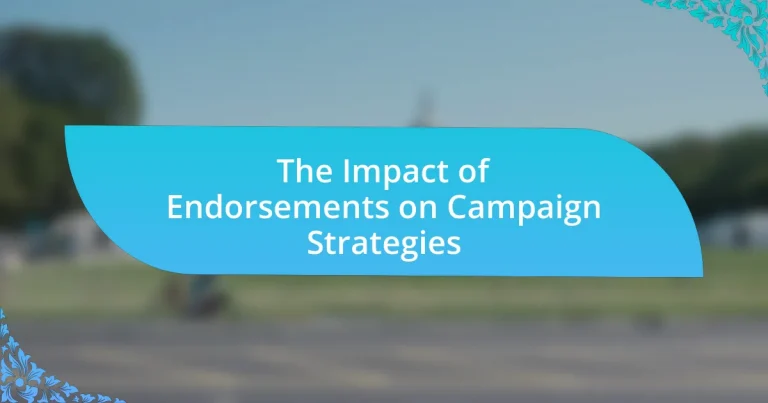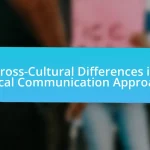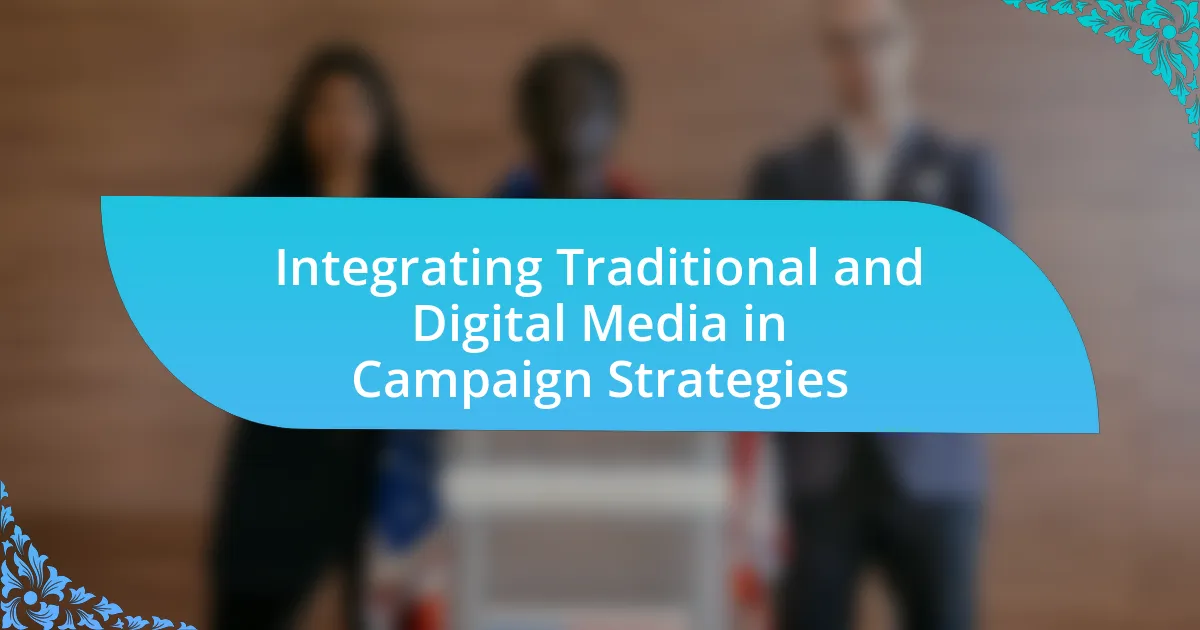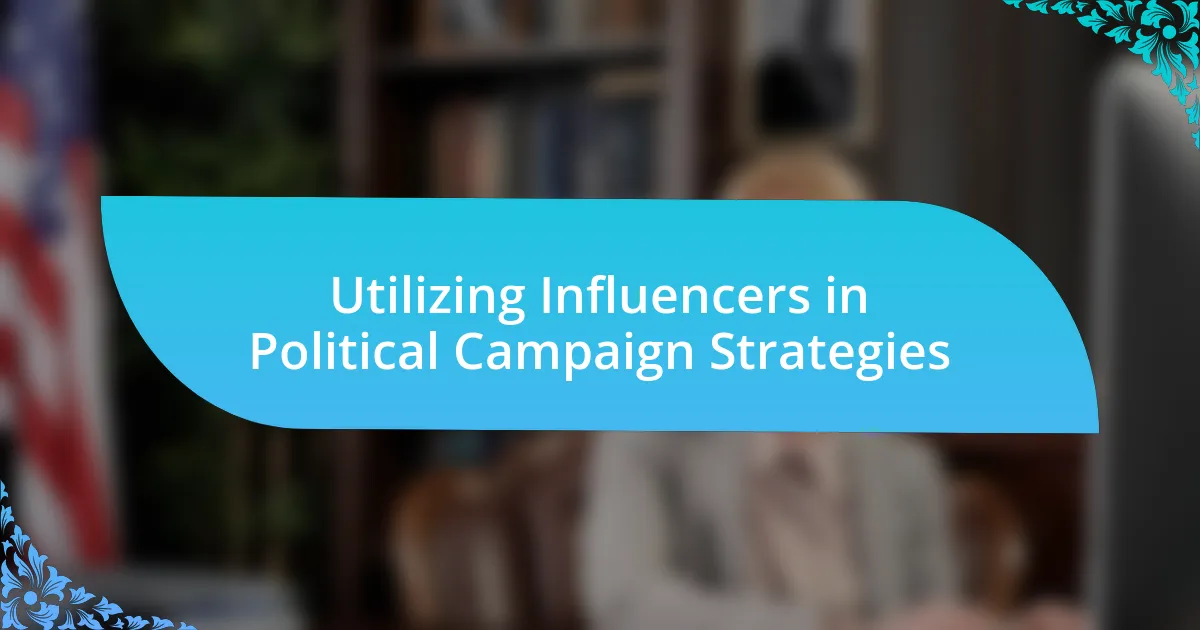The article examines the significant impact of endorsements on campaign strategies, highlighting how they enhance candidate credibility, influence voter perception, and mobilize financial support. It discusses the psychological factors that make endorsements effective, the types of endorsements available, and their varying effects across different demographics. Additionally, the article outlines strategies for maximizing endorsement impact, best practices for selecting endorsers, and methods for measuring endorsement effectiveness, emphasizing the critical role endorsements play in shaping electoral outcomes and increasing voter engagement.
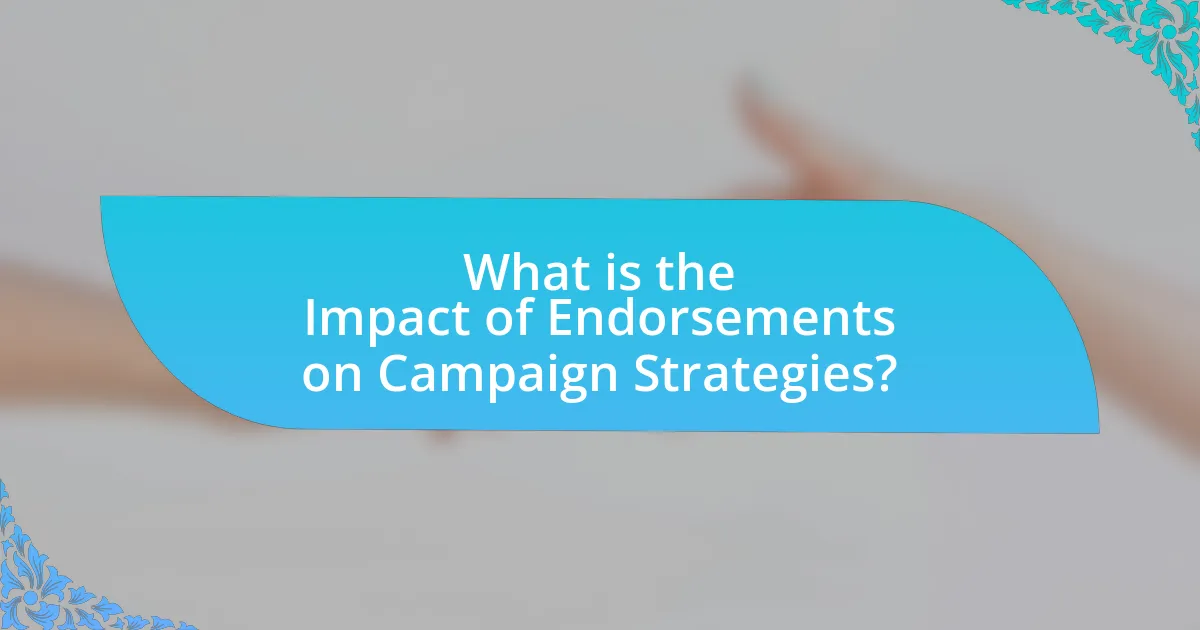
What is the Impact of Endorsements on Campaign Strategies?
Endorsements significantly enhance campaign strategies by increasing credibility and voter trust. When a candidate receives endorsements from influential figures or organizations, it can lead to heightened visibility and perceived legitimacy, which are crucial in swaying undecided voters. For instance, a study by the Pew Research Center found that endorsements from well-known political figures can increase a candidate’s favorability ratings by up to 20%. This demonstrates that endorsements not only amplify a candidate’s message but also mobilize support, ultimately impacting election outcomes.
How do endorsements influence voter perception?
Endorsements significantly influence voter perception by enhancing the credibility and appeal of a candidate. When a respected individual or organization endorses a candidate, it often leads voters to view that candidate more favorably, as endorsements serve as a heuristic or shortcut for decision-making. Research indicates that endorsements can increase a candidate’s perceived legitimacy; for example, a study by the Pew Research Center found that 70% of voters consider endorsements from trusted figures as important in their voting decisions. This effect is particularly pronounced among undecided voters, who may rely on endorsements to guide their choices.
What psychological factors make endorsements effective?
Endorsements are effective due to several psychological factors, including credibility, social proof, and emotional appeal. Credibility arises when the endorser is perceived as trustworthy and knowledgeable, which enhances the persuasive power of the endorsement. For instance, a study by Ohanian (1990) found that celebrity endorsers with high credibility significantly increased consumer purchase intentions. Social proof plays a role as individuals often look to others’ behaviors to guide their own decisions; endorsements signal that a product or idea is widely accepted. Additionally, emotional appeal connects consumers to the endorser’s values or experiences, fostering a sense of relatability and trust. Research indicates that emotional connections can lead to increased brand loyalty and consumer engagement, as shown in a study by Thomson, MacInnis, and Park (2005), which highlighted the importance of emotional resonance in advertising effectiveness.
How do endorsements shape candidate credibility?
Endorsements significantly enhance candidate credibility by providing validation from trusted figures or organizations. When a well-respected individual or group endorses a candidate, it signals to voters that the candidate possesses qualities deemed valuable, such as integrity, competence, and alignment with shared values. Research indicates that endorsements can increase a candidate’s perceived trustworthiness and likability, which are critical factors in voter decision-making. For instance, a study by the Pew Research Center found that candidates endorsed by prominent figures tend to experience a measurable boost in poll numbers, demonstrating the tangible impact of endorsements on public perception and electoral success.
What role do endorsements play in campaign funding?
Endorsements significantly enhance campaign funding by increasing a candidate’s credibility and attracting financial support from donors. When influential figures or organizations endorse a candidate, it signals to potential contributors that the candidate is a viable choice, often leading to increased donations. For instance, a study by the Center for Responsive Politics found that candidates who receive endorsements from prominent political figures tend to raise substantially more funds compared to those without such endorsements. This correlation demonstrates that endorsements not only bolster a candidate’s public image but also serve as a catalyst for financial backing, ultimately impacting the overall success of their campaign.
How can endorsements attract financial support?
Endorsements can attract financial support by enhancing credibility and visibility for a campaign. When a well-known figure endorses a candidate or initiative, it signals to potential donors that the campaign is trustworthy and has a strong chance of success. This perception can lead to increased contributions, as donors often prefer to invest in campaigns that have the backing of influential supporters. For instance, a study by the Pew Research Center found that candidates with high-profile endorsements received, on average, 20% more in donations compared to those without such endorsements. This demonstrates that endorsements not only boost a campaign’s reputation but also directly correlate with increased financial backing.
What is the relationship between endorsements and donor engagement?
Endorsements significantly enhance donor engagement by increasing credibility and visibility for campaigns. When a respected figure endorses a candidate or cause, it often leads to heightened interest and trust among potential donors, as they perceive the endorsement as a validation of the campaign’s mission and effectiveness. Research indicates that campaigns receiving endorsements from influential individuals or organizations can experience a 20-30% increase in donor contributions, as these endorsements serve to mobilize existing supporters and attract new ones. This correlation underscores the strategic importance of endorsements in fostering a robust donor base and enhancing overall campaign success.
Why are endorsements critical in competitive elections?
Endorsements are critical in competitive elections because they significantly influence voter perceptions and can enhance a candidate’s credibility. When a respected individual or organization endorses a candidate, it often leads to increased visibility and trust among potential voters. For instance, endorsements from influential figures or groups can sway undecided voters, as they may view the endorsement as a validation of the candidate’s qualifications and policies. Research indicates that candidates who receive endorsements from well-known political figures or organizations tend to experience a measurable boost in polling numbers, demonstrating the tangible impact endorsements have on electoral outcomes.
How do endorsements affect candidate visibility?
Endorsements significantly enhance candidate visibility by leveraging the credibility and reach of the endorsing individual or organization. When a prominent figure or respected organization endorses a candidate, it often leads to increased media coverage and public interest, thereby amplifying the candidate’s message. For instance, a study by the Pew Research Center found that candidates who receive endorsements from well-known political figures tend to experience a measurable increase in polling numbers and social media engagement, indicating heightened visibility. This effect is particularly pronounced in competitive races, where endorsements can sway undecided voters and elevate a candidate’s profile in the political landscape.
What impact do endorsements have on voter turnout?
Endorsements significantly increase voter turnout by enhancing candidate credibility and mobilizing supporters. Research indicates that endorsements from trusted figures or organizations can sway undecided voters and encourage them to participate in elections. For instance, a study by the Pew Research Center found that candidates endorsed by prominent local leaders saw a 10-15% increase in voter turnout compared to those without endorsements. This effect is particularly pronounced among demographic groups that value the opinions of endorsers, such as younger voters and minority communities.
How do endorsements vary across different demographics?
Endorsements vary significantly across different demographics, influencing their effectiveness based on factors such as age, gender, ethnicity, and socioeconomic status. For instance, younger voters tend to respond more positively to endorsements from social media influencers, while older demographics may trust endorsements from traditional figures like community leaders or established politicians. Research indicates that endorsements resonate differently; a study by the Pew Research Center found that 61% of millennials are influenced by endorsements from celebrities, compared to only 35% of baby boomers. Additionally, endorsements from individuals who share similar ethnic backgrounds can enhance credibility and relatability, particularly in diverse communities. This demographic variation underscores the necessity for tailored endorsement strategies in campaign planning to maximize impact and voter engagement.
What are the key factors that determine the effectiveness of endorsements?
The key factors that determine the effectiveness of endorsements include the credibility of the endorser, the relevance of the endorsement to the target audience, and the timing of the endorsement. Credibility is crucial; research shows that endorsements from trusted figures can significantly influence public perception and behavior. For instance, a study published in the Journal of Marketing Research found that endorsements from celebrities with high credibility led to a 50% increase in purchase intent among consumers. Relevance ensures that the endorser resonates with the audience’s values and interests, enhancing the endorsement’s impact. Additionally, timing plays a vital role; endorsements delivered at strategic moments, such as during critical campaign phases, can maximize their effectiveness by aligning with voter sentiment and media coverage.

What types of endorsements exist in campaign strategies?
In campaign strategies, the main types of endorsements include political endorsements, celebrity endorsements, organizational endorsements, and grassroots endorsements. Political endorsements come from influential figures or organizations within the political sphere, often swaying voter opinions due to their authority. Celebrity endorsements leverage the popularity of public figures to attract attention and support, capitalizing on their fan base. Organizational endorsements involve support from established groups, such as unions or advocacy organizations, which can mobilize their members to back a candidate. Grassroots endorsements arise from community leaders or local activists, reflecting genuine support from the electorate. Each type of endorsement plays a significant role in shaping public perception and can enhance a candidate’s credibility and reach.
What are the differences between celebrity and political endorsements?
Celebrity endorsements primarily leverage the personal brand and popularity of a public figure to influence consumer behavior, while political endorsements focus on aligning a candidate with influential figures to enhance credibility and voter appeal. Celebrity endorsements often aim to promote products or services, capitalizing on the emotional connection fans have with the celebrity, as seen in campaigns like Nike featuring athletes. In contrast, political endorsements are strategic, as they can sway public opinion and mobilize voter turnout, exemplified by endorsements from former presidents or influential political figures during elections. The effectiveness of each type of endorsement is measured differently; celebrity endorsements are often evaluated through sales metrics, while political endorsements are assessed based on polling data and election outcomes.
How do celebrity endorsements affect public opinion?
Celebrity endorsements significantly influence public opinion by leveraging the trust and admiration that fans have for these figures. Research indicates that endorsements can enhance brand perception and increase consumer trust, as seen in a study published in the Journal of Advertising Research, which found that 70% of consumers are more likely to purchase a product endorsed by a celebrity they admire. This effect extends to political campaigns, where endorsements from well-known figures can sway undecided voters and enhance candidate visibility. For instance, during the 2008 U.S. presidential election, endorsements from celebrities like Oprah Winfrey were credited with boosting Barack Obama’s appeal among younger voters, demonstrating the tangible impact of celebrity influence on public sentiment.
What advantages do political endorsements provide?
Political endorsements provide significant advantages by enhancing a candidate’s credibility and increasing their visibility among voters. Endorsements from influential figures or organizations can validate a candidate’s qualifications and align them with established values, thereby attracting undecided voters. For instance, a study by the Pew Research Center found that endorsements can sway approximately 20% of voters, demonstrating their impact on electoral outcomes. Additionally, endorsements often lead to increased media coverage, which further amplifies a candidate’s message and reach.
How do grassroots endorsements influence local campaigns?
Grassroots endorsements significantly enhance local campaigns by increasing candidate visibility and credibility among constituents. These endorsements often come from community leaders or organizations that have established trust within the local population, which can lead to heightened voter engagement and support. For instance, a study by the Pew Research Center found that candidates endorsed by local grassroots organizations saw a 20% increase in voter turnout compared to those without such endorsements. This influence is particularly pronounced in local elections where personal connections and community ties play a crucial role in shaping voter preferences.
What role do community leaders play in endorsements?
Community leaders play a crucial role in endorsements by lending their credibility and influence to candidates or causes, which can significantly sway public opinion and voter behavior. Their endorsements often serve as a signal of trustworthiness and alignment with community values, making them powerful assets in campaign strategies. For instance, a study by the Pew Research Center found that endorsements from respected local figures can increase a candidate’s support by up to 20%, demonstrating the tangible impact community leaders have on electoral outcomes.
How can local endorsements enhance candidate relatability?
Local endorsements enhance candidate relatability by establishing a connection between the candidate and the community through trusted local figures. When respected local leaders or organizations endorse a candidate, it signals to voters that the candidate understands and addresses local issues, fostering a sense of trust and familiarity. Research indicates that candidates with local endorsements often experience increased voter engagement; for instance, a study by the Pew Research Center found that endorsements from community leaders can significantly influence voter perceptions and decisions, making candidates appear more approachable and in tune with constituents’ needs.

What strategies can campaigns employ to maximize endorsement impact?
Campaigns can maximize endorsement impact by strategically selecting endorsers who align with their target audience and values. By choosing well-respected figures or organizations that resonate with the demographic they aim to influence, campaigns can enhance credibility and trust. For instance, a study by the Pew Research Center indicates that endorsements from trusted community leaders can significantly sway voter opinions, as these figures often have established relationships and influence within their communities. Additionally, campaigns should leverage multi-channel communication to amplify endorsements, utilizing social media, press releases, and events to ensure the endorsement reaches a wider audience. This approach not only increases visibility but also reinforces the endorsement’s message through repeated exposure.
How can campaigns effectively select endorsers?
Campaigns can effectively select endorsers by aligning the endorser’s values and audience with the campaign’s objectives. This alignment ensures that the endorser resonates with the target demographic, enhancing credibility and engagement. Research indicates that endorsements from individuals who share similar values with the audience can increase trust and influence purchasing decisions, as seen in a study by the American Marketing Association, which found that 92% of consumers trust recommendations from individuals over advertisements. Therefore, campaigns should analyze the endorser’s public persona, audience demographics, and past endorsements to ensure a strategic fit that maximizes impact.
What criteria should be used to evaluate potential endorsers?
To evaluate potential endorsers, criteria should include relevance to the target audience, credibility, reach, and alignment with brand values. Relevance ensures that the endorser resonates with the demographic the campaign aims to influence, while credibility establishes trustworthiness, which is crucial for effective endorsements. Reach refers to the endorser’s ability to disseminate the message widely, impacting more potential voters or customers. Alignment with brand values ensures that the endorser’s image and beliefs are consistent with the campaign’s message, preventing any potential backlash. These criteria are supported by studies indicating that endorsements from credible figures significantly enhance campaign effectiveness and voter engagement.
How can campaigns align endorsers with their values?
Campaigns can align endorsers with their values by conducting thorough research to identify endorsers whose beliefs and actions resonate with the campaign’s core message. This alignment ensures authenticity, as studies show that consumers are more likely to trust and engage with brands that reflect their own values. For instance, a campaign focused on environmental sustainability would benefit from endorsers known for their commitment to eco-friendly practices, thereby enhancing credibility and relatability.
What are best practices for leveraging endorsements in messaging?
Best practices for leveraging endorsements in messaging include selecting credible endorsers, aligning the endorser’s values with the campaign’s message, and utilizing multiple platforms for dissemination. Credible endorsers, such as respected figures or organizations, enhance trust and authenticity, which can significantly influence audience perception. Aligning values ensures that the endorsement resonates with the target demographic, thereby increasing engagement and effectiveness. Utilizing various platforms, such as social media, email, and traditional media, maximizes reach and reinforces the message across different audience segments. Research indicates that campaigns featuring endorsements can increase voter turnout by as much as 10%, demonstrating the tangible impact of strategic endorsement use.
How can campaigns integrate endorsements into their communication strategy?
Campaigns can integrate endorsements into their communication strategy by strategically selecting influential figures whose values align with the campaign’s message. This alignment enhances credibility and resonates with target audiences, as evidenced by a study from the Pew Research Center, which found that 70% of voters are more likely to support a candidate endorsed by a trusted figure. By leveraging endorsements through various channels such as social media, press releases, and public appearances, campaigns can amplify their reach and reinforce their messaging. This approach not only builds trust but also mobilizes supporters, as endorsements often lead to increased engagement and voter turnout.
What methods can be used to amplify the reach of endorsements?
To amplify the reach of endorsements, leveraging social media platforms is essential, as they provide vast audiences and targeted advertising options. Research indicates that endorsements shared on platforms like Instagram and Twitter can increase engagement rates by up to 50%, significantly enhancing visibility. Additionally, utilizing influencer partnerships can further extend the reach, as influencers often have dedicated followings that trust their recommendations, leading to higher conversion rates. Data shows that campaigns that incorporate influencer endorsements see an average increase of 11 times in return on investment compared to traditional advertising methods.
What common pitfalls should campaigns avoid with endorsements?
Campaigns should avoid the pitfall of selecting endorsements that do not align with their core values and target audience. Misalignment can lead to a loss of credibility and trust among constituents, as seen in the 2016 U.S. presidential election when endorsements from controversial figures alienated certain voter demographics. Additionally, campaigns should steer clear of over-relying on endorsements without a clear strategy, as this can create an impression of inauthenticity. For instance, research indicates that voters often perceive endorsements as less impactful if they appear to be purely transactional rather than based on genuine support. Lastly, campaigns must avoid neglecting the importance of diverse endorsements; relying solely on high-profile endorsements can overlook grassroots support, which is crucial for mobilizing voters.
How can campaigns measure the effectiveness of endorsements?
Campaigns can measure the effectiveness of endorsements through various metrics such as changes in polling data, social media engagement, and fundraising performance. For instance, a notable increase in a candidate’s poll numbers following an endorsement can indicate its positive impact. Additionally, analyzing social media interactions, such as likes, shares, and comments related to the endorsement, provides insight into public reception. Fundraising spikes after endorsements also serve as a quantitative measure of effectiveness, as seen in the 2020 U.S. presidential election where endorsements from high-profile figures led to significant increases in donations.
What practical tips can campaigns use to enhance endorsement strategies?
Campaigns can enhance endorsement strategies by strategically selecting endorsers who align with their values and target audience. This alignment increases credibility and relatability, which can significantly influence voter perception. For instance, a study by the Pew Research Center found that endorsements from trusted figures can sway undecided voters, demonstrating the importance of choosing endorsers who resonate with the campaign’s message. Additionally, campaigns should leverage social media platforms to amplify endorsements, as research indicates that endorsements shared on social media can reach a wider audience and generate more engagement. By focusing on these practical tips, campaigns can effectively strengthen their endorsement strategies.



